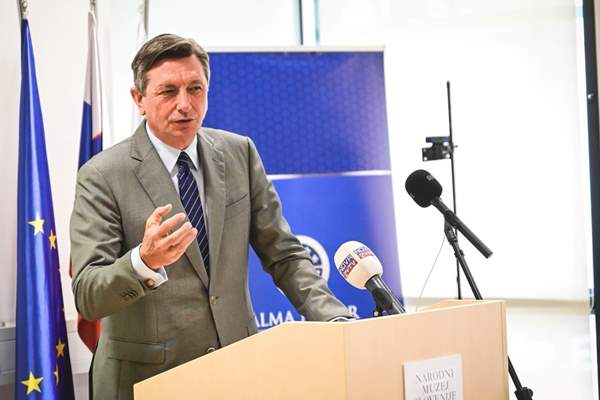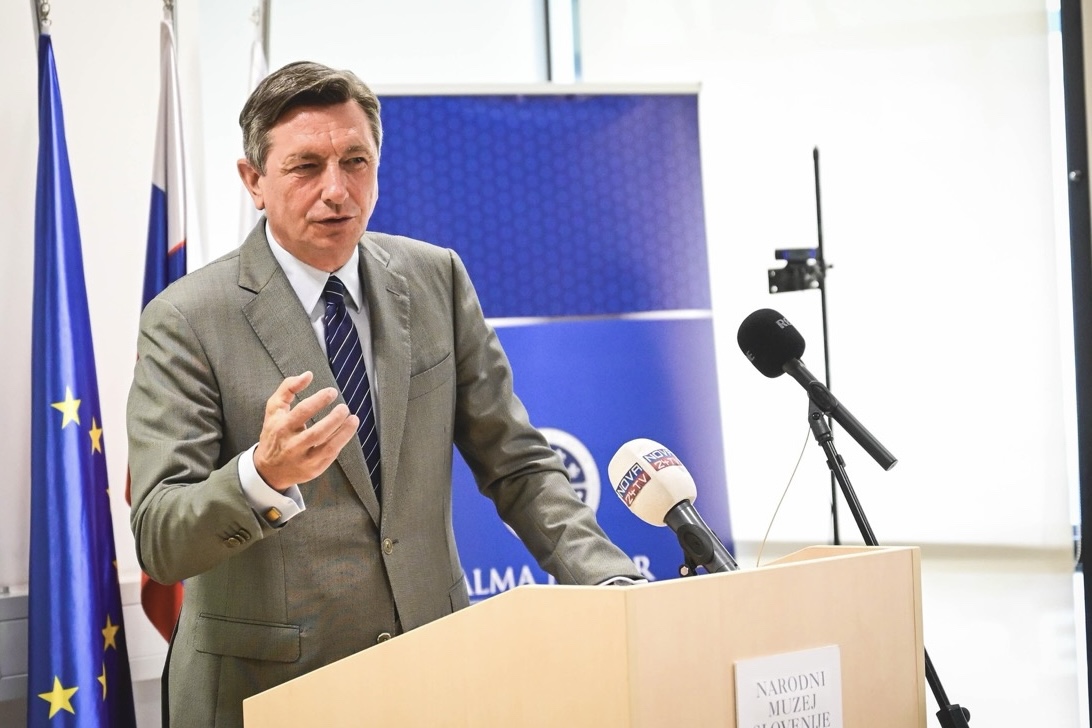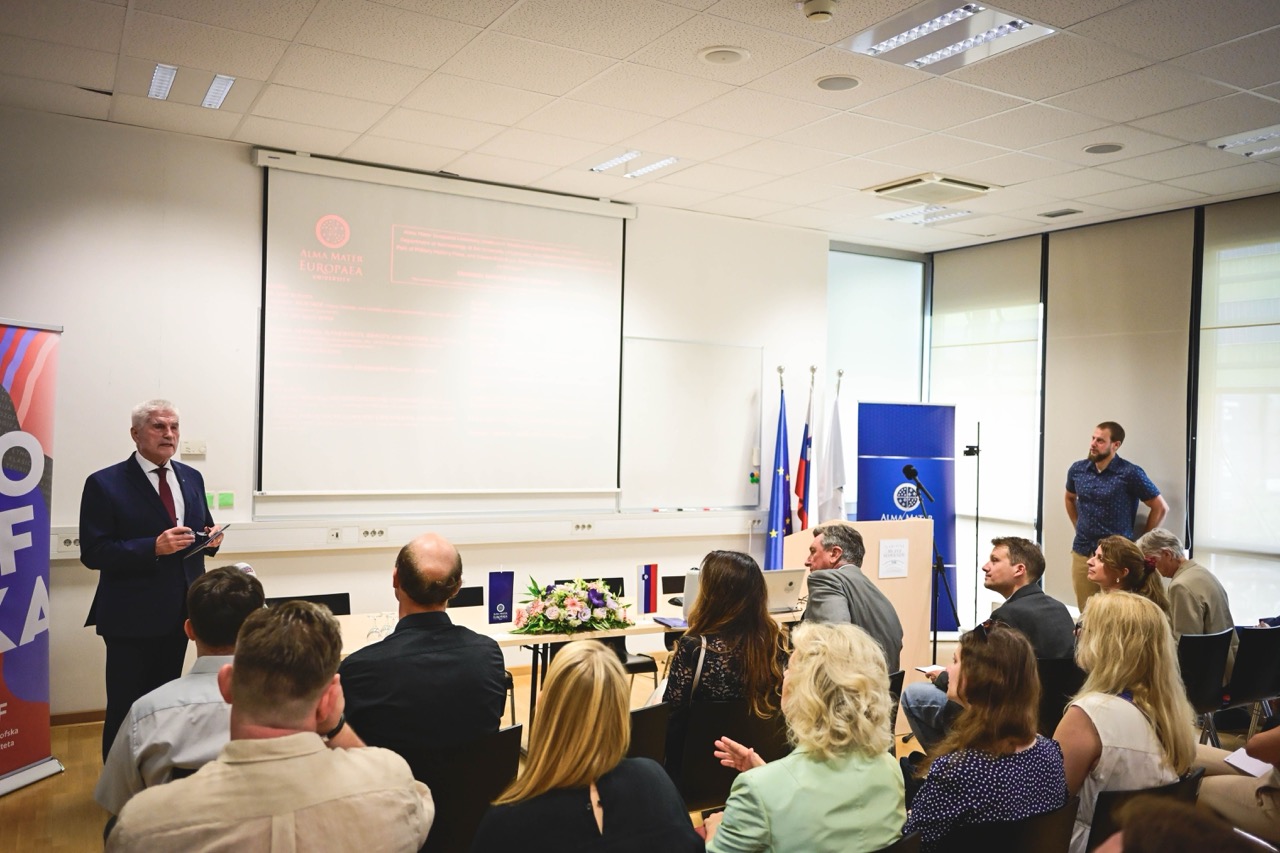
Cultural Heritage is the Key to Overcoming Social Challenges

"We Europeans must be aware of our identity; it is the key to overcoming political instability and conflicts. Our identity is based on a rich cultural heritage, shared values, and historical experiences that connect us and enable us to face modern challenges."
With these words, former President of the Republic of Slovenia, Borut Pahor, as the honorary patron, inaugurated the summer school of Alma Mater Europaea University titled Heritage Studies, which took place this morning at the National Museum of Slovenia Metelkova in Ljubljana.

The summer school, organized by Alma Mater Europaea-ISH University in collaboration with the Department of Archaeology of the University of Ljubljana, the National Museum of Slovenia, the Pivka Military History Park, and the company Krasen Kras, will focus on the significance and impact of cultural Heritage. The five-day program will include lectures by renowned domestic and foreign lecturers, two one-day excursions, museum visits, workshops, and experimental archaeology.
Rector of Alma Mater Europaea University, Professor Dr. Ludvik Toplak, emphasized that the study programs of Alma Mater Europaea - ISH combine the rich cultural Heritage of the humanities from ancient civilizations. "This Heritage deals with the eternal questions of humanity while simultaneously addressing modern challenges in applied humanities. In this interdisciplinary domain, the humanities, social, environmental, and health sciences converge in digital, medical, and environmental humanities to overcome social challenges."

The event occurred at the National Museum of Slovenia Metelkova, which offers an extensive and in-depth permanent exhibition of study collections. "Heritage studies is a scientific discipline that deals with tangible and intangible cultural Heritage. Cultural Heritage is a way of establishing identity, national identity, and other identities related to our self-image. It is certainly one of the important branches of knowledge that should be known not only by future scientists or museum workers but also by the general public," said the museum's director, Professor Dr. Mateja Kos Zabel.
Professor Dr. Katharina Zanier, head of the Department of Archaeology at the University of Ljubljana, emphasized the importance of interdisciplinary and inter-institutional cooperation in archaeology and cultural Heritage, which is crucial for understanding the past and shaping the future
Professor Dr. Jelka Pirkovič from the Faculty of Arts, University of Ljubljana, added: "Typically, identity includes individuals' sense of connection with their community based on shared values and memories. Society becomes visible to itself and others through its cultural Heritage."
"Museum documentation promotes the democratization of society through transparency, inclusion, and accessibility. Standardized and digital documentation of artifacts allows broader access to cultural Heritage and participation in cultural discourse. Museums thus become key spaces for public education and community engagement, and participatory processes empower individuals and strengthen democratic values," explained Professor Dr. Goran Zlodi from the University of Zagreb.
Professor Dr. Csaba Szabó from the Department of Religious Studies at the Faculty of Arts, University of Szeged in Hungary, highlighted the importance of the material Heritage of the Roman Empire and modern approaches in public archaeology to present Roman religion.
Professor Dr. Verena Perko from the University of Ljubljana and the New University of Ljubljana concluded: "Heritage is crucial for identity, education, and development, but it remains alienated due to scientific terminology. The interpretation of Heritage establishes a bridge between scientific knowledge and the public, enabling the understanding and experience of Heritage as part of identity and education. Interpretation processes include modern technologies and community collaboration, contributing to preserving Heritage for the future."
More than 50 participants of the Erasmus summer school came from all over Europe, further strengthening the international dimension of the event. Lectures on Tuesday and Wednesday (July 9 and 10, 2024) at the National Museum of Slovenia Metelkova can be followed online at THIS link.
PROGRAM:
Tuesday:
III. Session: HERITAGE INTERPRETATION AND COMMUNICATION (between science and the public, the role of museology and museums, documentation, the public and new technologies...):**
8:00 - Keynote lecture: Assist. Prof. Ddr. Verena Perko, University of Ljubljana, New University, Slovenia
8:45 - Prof. Dr. Emilio Marin, Professor Emeritus, Ambassador Retired, Académie des Inscriptions et Belles-Lettres, Institut de France/ European Academy of Sciences and Arts/ Pontificia Accademia Romana di Archeologia/ Academia de Buenas Letras, The Case of the Augusteum at Narona
9:15 - Dr. Birgitta Hoffmann, Roman Gask Project: Bridging a Gap or Creating a Bridgehead: Thoughts on Communicating Archaeological Research on the Roman Frontier Gask Ridge to the Local Communities
9:40 - Prof. Dr. Haris Dervišević, University of Sarajevo, Stories Behind Artefacts: Sarajevo 17th Century Safavid Carpets (online)
10:10 - Assist. Prof. Dr. Lenka Vargova, Experimental Archaeology and Reenactions in Museum
Discussion
10:40 - Coffee break
IV. Session: PUBLIC ARCHEOLOGY AND EXPERIMENTAL ARCHAEOLOGY (scientific paradigms, the emergence of public archaeology and ecomuseums, museum inclusion, new technologies…):**
11:00 - Keynote lecture: Prof. Dr. Csaba Szabó, Public Archaeology and the Heritage of Ancient Rome in Central-Eastern Europe. The Case Study of Roman Sanctuaries in the Danube Region.
11:45 - Dr. Andrej Magdič, Institute for the Protection of Cultural Heritage of Slovenia; Protection of Archaeological Heritage and Involvement of Local Publics
12:05 - Dr. Tadej Curk, Museum of Sport, Slovenia, Multivocality and Archaeology
12:25 - Jana Puhar, University of Ljubljana, Archaeology for the Public and Local Public Involvement
12:45 - Coffee break
13:00 - Marta Alberti, Deputy Director of Excavations, The Vindolanda Trust Chesterholm Museum, Bardon Mill Hexham, Northumberland
13:25 - Ddr. Stefanie Hoss, Cutlery and Table Manners in the Northwestern Provinces of the Roman Empire
13:50 - Petra Stipančić, Dolenjski Muzej, Situla Festival
14:10 - Dr. Maša Saccara, Revitalization of Ancient Settlements in the Context of Sustainable Tourism
Discussion
16:00 - Visiting Ig Pile Dwelling – Morostig – the House of Nature and Piles (drive to Ig with the bus ca. 15:00)
Introductory lecture to the visit: Prof. Aleksander Ostan, University of Ljubljana: Architecture as Heritage Interpretation.
Experimental Archaeology: Polona Janežič, Slovenia
Wednesday:
V. Session: CONTESTED HERITAGE (collective memory and places of memory, trauma and the role of catharsis, social meanings of difficult heritage…):
9:30 – 10:15 - Keynote lecture: Dr. Rosvita Pesek / Prof. Dr. Mitja Ferenc, The Independence of the Republic Slovenia and Slovenian Contested Heritage
10:30 - Assist. Prof. Lejla Džumhur, University of Sarajevo, “TRAUMATIC HERITAGE PLACES (THP) - VALUES AND MANAGEMENT. A Case Study of Sarajevo Historic Urban Landscape”
11:00 - Coffee break
11:15 - Assist. Daniel Siter, Researcher and PhD Candidate, Alma Mater Europaea University - Faculty ISH and IRC Maribor, "Difficult Heritage" as a Historical Source and Instrument of Learning: Cases of Rogaška Slatina & Obersalzberg
11:45 - Dr. Uroš Košir, "Archaeology of Dark Heritage in Slovenia"
12:15 - Prof. Dr. Emilio Marin, Professor Emeritus, Ambassador Retired, Académie des Inscriptions et Belles-Lettres, Institut de France/ European Academy of Sciences and Arts/ Pontificia Accademia Romana di Archeologia/ Academia de Buenas Letras, Contested Heritage and Collective Memory: Some Examples in Europe During the Period of the Roman Empire
12:45 - Mag. Janko Boštjančič, Museums and the Difficult Heritage of Military Armaments / The lecture will be presented at the Military History Park in Pivka
13:10 - Prof. Dr. Renata Šribar, Alma Mater Europaea University, University of Ljubljana PEF and Center FemA, Structural Conditions and Personal Challenges of the Archaeological Fieldwork: An Auto/Biographical Case Study of Trauma and Catharsis
Discussion
13:40 - 14:30 - Lunch break











